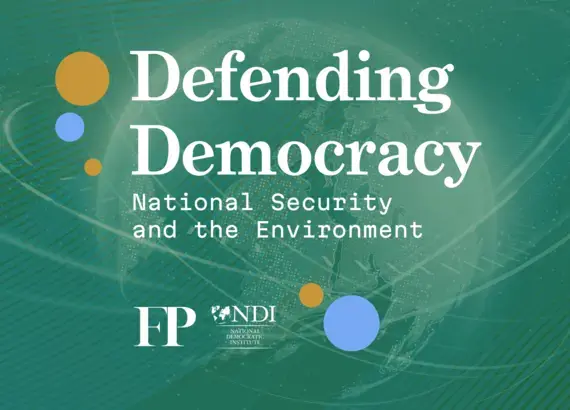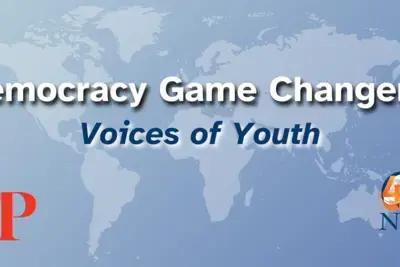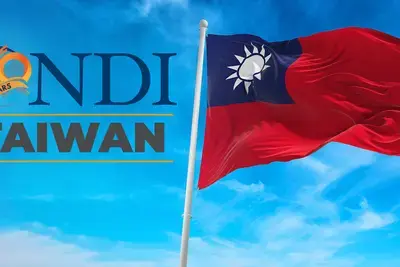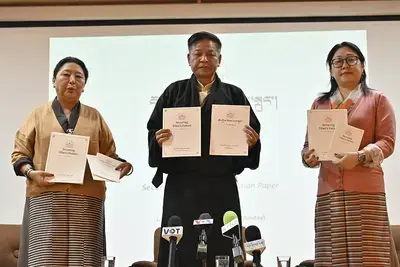
Success Story
Defending Democracy: National Security and the Environment
In partnership with Foreign Policy, NDI hosted a fifth dialogue in our “game changer” series about authoritarian exploitation of the environment and how local partners are mobilizing to counter these threats. The event featured U.S. Representative Raja Krishnamoorthi, and a panel of three activists – Hanna Khomechko, Dolma Tsering Teykhang and Emmanuel Umpula Nkumbe – who are working to stop environmental degradation in Ukraine, Tibet and the Democratic Republic of Congo (DRC) respectively. NDI Board member and former National Security Advisor for Democracy and Human Rights, Shanthi Kalathil, provided closing remarks that tied the emerging trends together.
The event highlighted the strategies and policies that are empowering communities to counter illiberal activities in defense of the environment and democratic principles. Opening keynote speaker, Representative Krishnamoorthi, who serves as the Ranking Member of the House Select Committee on the Strategic Competition Between the United States and the Chinese Communist Party (CCP), stressed the importance of pushing back against the environmentally exploitative tactics of China, particularly concerning rare earth minerals. He said the CCP's near monopoly on certain minerals is a great concern – and that the United States must simultaneously stand up for the environment, call out human rights abuses and push back against CCP aggression. He suggested turning to democratic partners and allies for access to critical minerals, as well as taxing polluters and establishing price supports in order to support sustainable environmental practices in sourcing minerals from developing democracies. Lastly, he emphasized the critical role of U.S. assistance on environmental issues to simultaneously support democratic development and environmental preservation.
The panel of local partners focused on the tools of democracy that are being used to counter authoritarian exploitation of the environment. Each panelist talked about the unique environmental issues they face, how rising authoritarianism is exacerbating these issues and how democracy can be a part of the solution.
Hanna Khomechko, the development director of the International organization Environment-People-Law (EPL), discussed the immense environmental devastation caused by Russia’s invasion and occupation of parts of Ukraine. Hanna said that such environmental destruction amounted to “ecocide” or mass destruction of nature. EPL is working with governments to define and codify “ecocide” in both national and international law and create mechanisms to prevent further destruction.
Emmanuel Umpula Nkumba, Executive Director of African Natural Resources Watch (AFREWATCH), spoke about the serious environmental consequences of mining in the DRC. He described the impact of mining practices, the devastating consequences for local communities and how they have gotten worse under Chinese control of the mines. He then described how AFREWATCH is working at the grassroots level to raise local awareness and train citizens to lodge complaints, as official regulations are often ignored. This allows people in the DRC to push back against these mining practices and gives a mechanism for democratic accountability.
The final panelist, Deputy Speaker of the Tibetan Parliament-In-Exile Dolma Tsering Teykhang, spoke about the environmental challenges that Tibet faces under Chinese control. China’s disregard for the local environment, diverting of rivers and exploitation of resources has harmed both the people and natural environment of Tibet. The Parliament-In-Exile works to educate international audiences on the situation in Tibet and the harsh realities for the environment and people of Tibet from the CCP’s autocratic governance in order to mobilize pressure and action against the Chinese government. Together, the panelists showed the trend of authoritarian environmental degradation and how democratic forces in many countries are pushing back.
Shanthi Kalathil concluded the event with remarks that contextualized and underscored the environmental and authoritarian challenges that the speakers discussed. She spoke about the importance of blending together the issues of the environment and democracy and how activism in both spaces can effectively push back against authoritarianism. Ms Kalathil added that the most effective tool to push back against authoritarian environmental destruction is democratic governance–which gives local populations the mechanisms to resist from the bottom up.
As demonstrated by the stories of these activists and leaders, authoritarian and illiberal regimes produce harsh and grim externalities on both natural habitats and democratic ideals. Given the current landscape, this NDI and Foreign Policy event proudly featured the work of “game-changers” who are providing the tools and skills necessary to establish ecological stewardship and democratic accountability in their communities. In tandem, these forces bolster their power and mutually reinforce one another to serve as a bulwark against the attacks on the environment from illiberal and authoritarian regimes.
Other NDI/Foreign Policy events featuring game changers who are defending democracy on topics of critical importance include:



